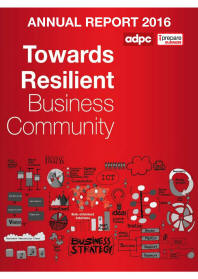- About Us
-
Who we are
-
- Publications
-
- ADPC Academy
-
MediaADPC'S NEWS
Private sector to prepare for disasters by business continuity planning Private sector to prepare for disasters by business continuity planning
27 Nov 2013
Bangkok, Thailand
A national consultation on private sector’s engagement in disaster risk reduction through effective business continuity planning brought together representatives from several government and private sector agencies, UN agencies and regional organizations at the end of November.
Organized by Asian Disaster Preparedness Center in Bangkok, the consultation was part of a project focusing on the improvement of SME’s disaster resilience in Thailand and in the Ayutthaya province in particular. The aim is to strengthen SME’s resilience to natural hazard risks and adaptation to climate change as well as develop practical guidelines and build enterprises’ capacities to develop business continuity plans themselves.
“Through this project we want to support the private sector and especially SMEs to engage themselves in disaster risk reduction. We encourage the SMEs to develop business continuity plans to minimize the effects of future emergencies that would cause business disruption”, says Mr. Aslam Pervaiz, Head of Department of Disaster Risk Management Systems at ADPC.
The project is implemented in cooperation with the Office for Small and Medium Enterprise Promotion (OSMEP) and the Department of Disaster Mitigation and Preparedness (DDPM), and funded by JTI Foundation.
Thai SMEs have a crucial role in disaster preparedness measures
The role of SMEs in disaster risk reduction is extremely important in Thailand due to the fact that the majority of Thais are involved in small and medium enterprises in some way, said Mr. Thavirap Tantiwongse, Public Affairs Director from GlaxoSmithKline (Thailand) Ltd at the consultation workshop.
“Most people engage in commercial enterprises without planning for an exit. They have not thought about their risk appetite and therefore they have not prepared themselves to avoid risk. Most of the time enterprises react to a situation – they donīt proactively prepare and mitigate risks,” Mr. Tantiwongse said.
He emphasized that before an enterprise drafts a business continuity plan, it must have a business plan and a systematized budgeting process in place.
“The business continuity plan can then be turned into the language of loss minimization. It can be quantitatively demonstrated that if an enterprise loses half of its capital, it has to double its income just to make it back. That is very hard for any business, so best not lose it in the first place,” Mr. Tantiwongse stated.
Managing Director Mr. Andrew Durieux from Coverage Ltd. called for measures from the government to encourage SMEs in drafting business continuity plans.
“The government should provide training and incentives for enterprises to do the planning. It should communicate to business people why having a business continuity plan is so important. At the same time, the insurance industry should offer cheaper premiums for companies that do business continuity plans, and banks should require their corporate customers to have a business continuity plan in place as a condition for bigger loans,” Mr. Durieux pointed out.
Related PublicationsLatest NewsRelated Trainings
-
